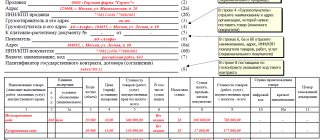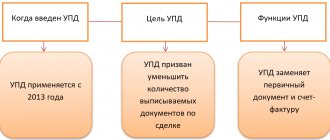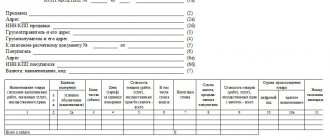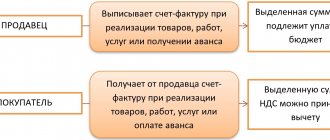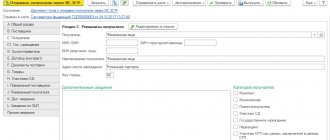The counterparty does not issue an invoice. How to get a VAT tax deduction
Why do the courts refuse to force counterparties to issue an invoice? How to formulate an agreement in order to receive an invoice from the counterparty. What documents can replace an invoice?
Attention! You are on a professional website for trial lawyers. Registration may be required to read this article.
| Natalya Aleksandrovna Chikunova, lawyer at DS Law Law Firm |
The taxpayer can reduce the total amount of value added tax by the amount of tax deductions (Article 171 of the Tax Code of the Russian Federation).
To receive such a deduction, a number of conditions must be met: the goods (work, services) purchased by the taxpayer, property rights must be intended for carrying out transactions subject to VAT; the taxpayer must accept goods (work, services), property rights for accounting; and finally, the VAT taxpayer must have a properly executed invoice and relevant source documents. If the first two conditions depend entirely on the taxpayer himself, then difficulties may arise with the invoice through no fault of his own. For example, the counterparty may not issue an invoice, and contacting him with such a request may be ineffective. Is it possible that in this case the taxpayer will be deprived of the right to a tax deduction? The law does not give a direct answer to this question, however, judicial practice has developed a certain mechanism of action in case the counterparty refuses to issue an invoice.
Useful documents for trial lawyers
An invoice is the basis for the buyer’s acceptance of goods (work, services), property rights presented by the seller (including the commission agent, agent who sell goods (work, services), property rights on their own behalf), tax amounts to be deducted (clause 1 Article 169 of the Tax Code of the Russian Federation).
Regulatory legal acts regulating the procedure for issuing and processing invoices are the Tax Code of the Russian Federation and Decree of the Government of the Russian Federation dated December 26, 2011 No. 1137 “On the forms and rules for filling out (maintaining) documents used in calculations for value added tax” (hereinafter referred to as the Resolution No. 1137).
When selling goods (work, services), transferring property rights, as well as upon receiving amounts of payment, partial payment for upcoming deliveries of goods (performance of work, provision of services), transfer of property rights, appropriate invoices are issued (Article 168 of the Tax Code of the Russian Federation) .
These documents are issued no later than 5 calendar days from the date of shipment of goods (performance of work, provision of services), transfer of property rights or from the date of receipt of payment amounts, partial payment for upcoming deliveries of goods (performance of work, provision of services), transfer of property rights.
Thus, the seller has 5 days to issue the appropriate invoice to the buyer.
The invoice form, as well as the rules for filling out, are approved by Resolution No. 1137.
At the same time, neither the Tax Code of the Russian Federation nor Resolution No. 1137 provide for a mechanism by which the buyer has the right to require the seller to issue an invoice.
Thus, if the counterparty fails to issue an invoice, the only way to oblige the counterparty to fulfill its obligations is to go to court to protect its violated rights. Judicial practice on this issue has developed ambiguous.
In some judicial acts, courts indicate that the buyer has the right to make a demand to the counterparty to provide an invoice. This approach is based, first of all, on the fact that the requirement is aimed at suppressing violations of civil rights related to the execution of the contract.
For example, the court satisfied the company’s demands that the counterparty be obliged to issue an invoice. The decision of the court of first instance was also supported by higher courts (resolution of the Federal Antimonopoly Service of the Moscow District dated February 10, 2012 in case No. A40-24857/11-62-213). The judges applied the provisions of Art. Art.
12, 309–310 of the Civil Code of the Russian Federation and came to the conclusion that there are grounds for considering the claim as a requirement stated within the framework of civil obligations. The buyer was issued an invoice for the real estate being sold, in which VAT was not indicated in the purchase price.
The court indicated that this circumstance, in essence, does not reflect reliable information about the contract price agreed upon by the parties and is actually aimed at artificially inflating the value of real estate in favor of the seller.
The possibility of presenting demands for the provision of an invoice as a requirement aimed at suppressing violations of civil rights related to the execution of a contract is confirmed by judicial practice (Resolution of the Presidium of the Supreme Arbitration Court of the Russian Federation dated April 30, 2004 No. 101/04).
In this resolution, the Supreme Arbitration Court of the Russian Federation indicated that an interested person has the right to apply to an arbitration court for the protection of his violated or disputed rights and legitimate interests in the manner established by the Arbitration Procedure Code of the Russian Federation (Part 1 of Article 4 of the Arbitration Procedure Code of the Russian Federation). The arbitration court has jurisdiction over cases of economic disputes and other cases related to the implementation of entrepreneurial and other economic activities (Part 1 of Article 27 of the Arbitration Procedure Code of the Russian Federation).
The dispute regarding the committee’s obligation to issue an invoice for the apartment transferred to the plaintiff, since such an obligation is provided for in the contract, is related to the agreement of the parties and arose in connection with the implementation of economic activities.
Some courts refuse to apply the provisions of the Civil Code of the Russian Federation to tax relations
There is also the opposite judicial practice, according to which the methods of protecting rights established by civil law are not applicable to tax legal relations. Therefore, arbitration courts sometimes refuse a buyer who requires the seller to issue an invoice.
For example, the court declared the company’s demand to oblige the counterparty to issue an invoice to it to be unlawful (resolution of the Federal Antimonopoly Service of the Volga-Vyatka District dated September 24, 2008 in case No. A11-11888/2007-K1-9/605-40).
As a basis for refusal, the court indicated that the norms of the Tax Code of the Russian Federation do not establish the seller’s obligation to transfer the invoice, and tax legislation does not regulate civil legal relations and does not apply to them.
An invoice is not a document related to the goods (works) and subject to transfer to the buyer in fulfillment of the terms of the contract.
In another case, the company also went to court with a demand to oblige the counterparty to issue an invoice (resolution of the Federal Antimonopoly Service of the East Siberian District dated September 26, 2006 in case No. A19-9546/06-16).
The court refused, citing the fact that civil legislation does not apply to property relations based on administrative or other power subordination of one party to the other, including tax ones (Part 3 of Article 2 of the Civil Code of the Russian Federation).
Source: https://www.arbitr-praktika.ru/article/121-red-kontragent-ne-vystavlyaet-schet-fakturu-kak-poluchit-nalogovyy-vychet-po-nds
Opinion of judges, tax authorities and lawyers
Other judges, tax specialists and lawyers believe that in such a situation there is a kind of transfer of public law concepts into the sphere of private law by enshrining the former in a civil law contract. Accordingly, if the transaction partner does not issue an invoice, this can be classified as a violation of the obligation enshrined in the private law agreement, and can easily go to court. Therefore, Articles 15 and 309 of the Civil Code of the Russian Federation should be used here. There are currently indeed cases of recovery of damages from a partner in the form of VAT deductions (though very few - for example, decisions of the FAS of the Volga District dated August 26, 2009 No. A65-25888/2008, the Seventeenth Arbitration Court of Appeal dated December 14, 2010. No. 17AP-11862/2010-GK in case No. A50-12478/20104, Eighth Arbitration Court of Appeal dated February 14, 2013 in case No. A75-6948/2012, Ninth Arbitration Court of Appeal dated October 10, 2013 No. 09AP-32624 /2013-GK in case No. A40-95423/ 2012 and dated January 16, 2012 No. 09AP-32926/2011-AK in case No. A40-48916/ 11-11-403). Moreover, in the “arsenal” of decisions of the arbitrators there is a resolution of the Supreme Arbitration Court (PP of the Supreme Arbitration Court of the Russian Federation dated April 9, 2009 No. 16318/08 in case No. A40-37607/07-51-379), from which it is clear that the servants of Themis considered the issue of refusal to refund VAT overpaid to the seller by the buyer due to an erroneous tax rate, unjust enrichment of the seller, i.e. from the point of view of civil law. And despite the fact that in that dispute it was not about losses, it is quite possible to use it as an additional, albeit indirect, argument. However, it should be remembered that if a company decides to go to arbitration to recover from a partner an amount equal to the uncollected VAT deduction, then it will need, in particular, to prove to the arbitrators that the inspectors refused precisely because there were no documents among the documents provided. invoices. But here another difficulty may arise.
“The fact is,” explains tax lawyer Sergei Voronin, “that the Constitutional Court once already indicated, and the arbitration courts supported the conclusion that an invoice is not the only document confirming the right to a VAT deduction, and the latter can well be confirmed by other papers , indicating payment of value added tax (definition of the Constitutional Court of the Russian Federation dated October 2, 2003 No. 384-O, resolution of the Federal Antimonopoly Service of the West Siberian District dated March 17, 2011 No. A70-1837/2010, Federal Antimonopoly Service of the Moscow District dated September 28, 2011 No. A40-143191/10-28-1189, determination of the Supreme Arbitration Court of the Russian Federation dated January 27, 2011 No. VAS-63/11). Thus, it will be more difficult to prove in arbitration that the deduction could not be obtained precisely because of the lack of an invoice. Therefore, before going to court, the affected company should try to obtain a deduction using other documents. And only if the tax authorities refuse her, should she go to arbitration. In this case, one of the main evidence will have to be this very refusal, which clearly states that the taxpayer’s demands are not supported precisely because of the lack of an invoice.”
Read also “Tax deductions for VAT in 2021”
What to do if the supplier does not provide documents
| » | Kazakhstan Accounting Forum www.balans.kz |
| altynay | |
| Added: | #1 Sat Mar 19, 2021 12:01:07 |
| The headline of the message: | The supplier has not provided an invoice for six months, what should I do? |
| The supplier has not provided an invoice for six months, what should I do? He does not answer our calls, we are located in different cities |
| Elena T | |
| Added: | #2 Thu Mar 24, 2021 14:43:06 |
| The headline of the message: | |
| altynay, do you have the rest of the documents? Agreement, certificate of completion of work? Does the contract stipulate the issuance of an invoice and penalties? If you have other documents, then post them without taking into account the invoice and, accordingly, without VAT. |
| altynay | |
| Added: | #3 Mon Apr 04, 2021 15:21:07 |
| The headline of the message: |
| Elena T says: |
| altynay, do you have the rest of the documents? Agreement, certificate of completion of work? Does the contract stipulate the issuance of an invoice and penalties? |
There is nothing, only non-cash payment from us in May. Is it possible to contact the tax office and write a complaint somewhere?
| Serikbayeva R. | |
| Added: | #4 Mon Apr 04, 2021 15:35:58 |
| The headline of the message: | |
| altynay, did the supplier deliver the goods/provide the service in full? How is there no agreement, but on what basis was the payment made? Look on the KGD website to see if they are being liquidated. To the legal and actual (if known) addresses, send a pre-trial claim with a registered notification about non-fulfillment of the terms of delivery/provision of services and demands to return the money to the bank account within 15-20 days (indicate the details and be sure to contact information). If you have their email, you can duplicate it there. At the end of the letter, threaten that you will be forced to file a claim with the SIES to collect the amount and penalty for the unlawful use of other people’s money under Article 353 of the Civil Code of the Republic of Kazakhstan. Maybe the gentlemen will come to their senses and at least get in touch. |
| altynay | |
| Added: | #5 Mon Apr 04, 2021 15:47:25 |
| The headline of the message: |
| Serikbayeva R. says: |
| did the supplier deliver the goods/provide the service in full? |
yes, we purchased the goods from him
Added after 54 seconds:
| Serikbayeva R. says: |
| How is there no agreement, but on what basis was the payment made? |
there is no contract, payment was made based on the invoice
Added after 1 minute 52 seconds:
| Serikbayeva R. says: |
| Look on the KGD website to see if they are being liquidated. |
It’s not in liquidation, I looked
Added after 1 minute 31 seconds:
Primary documents ► agreement, invoice, invoice, invoice, act - Elba
The primary document confirms various events in the business: the sale or purchase of goods, the provision of services to clients, the payment of salaries to employees, and others.
Depending on the event, the list of documents to be completed varies. Let's consider a common situation - a transaction involving the sale of goods and the provision of services. It is customary that the documents are prepared by the supplier or contractor.
Article “how to deceive in contracts”
- The contract is the beginning of the transaction. In it, you and the client determine the terms of cooperation: what, for what price and in what time frame you do. If the client is a regular one, you can draw up one agreement for several transactions.
- The invoice contains the amount to be paid, a list of goods and services and the bank details of the seller. This is an optional document, but is usually used for convenience.
- A cash receipt, sales receipt or strict reporting form confirms payment. Give them to the client who pays in cash or by card. When paying by bank transfer, payment is confirmed by the payment order.
- Invoice is a document that the supplier issues to the buyer when shipping goods.
- An act of provision of services or completed work is a document that the customer and the contractor sign based on the results of the provision of services or completion of work.
- Invoice - usually issued by individual entrepreneurs and LLCs using the general taxation system, because they work with VAT. In rare cases, invoices are issued using the simplified tax system, UTII and patent - read more about this in the article.
Create documents in three clicks
Create contracts, invoices, acts and invoices based on templates. The service will automatically fill in all the necessary document details. It will be more convenient than in Word. Try 30 days free
Agreement
Describes the rights and obligations of the parties to the transaction. Typically, a contract contains the following sections:
- Subject of the agreement: what is the result of the transaction.
- Contract amount and payment procedure: when and how much to pay.
- Rights and obligations of the parties: how the work happens.
- Responsibility of the parties: what happens if you or your partner violate the deadlines.
- The procedure for changing and terminating a contract: how to terminate a contract or accept additional agreements to it.
- Details of the parties: what are your and your partner’s current accounts, INN, OGRN and addresses.
The agreement is usually drawn up in 2 copies and contains the signatures of each party.
If you use a standard contract form with clients and replace the necessary details in Word or Excel, use templates in Elba. Upload your agreement template, and Elba will automatically fill in the details of the counterparty from the directory.
For some transactions, a written contract is not necessary at all. For example, a purchase and sale agreement is considered concluded from the moment a cash receipt, sales receipt or other document is issued to the buyer, which confirms the fact of payment. This does not mean that during a retail purchase and sale it is impossible to conclude an agreement in writing - the law does not prohibit this.
Templates of common agreements:
Service agreement template
Contract agreement template
Supply agreement template
Check
An optional document in which the seller indicates the price, quantity of goods and details for transferring payment.
You can come up with an invoice form for payment yourself or find a ready-made one on the Internet. An invoice can replace a contract if all essential terms of the transaction are included in it.
Invoice template
Elba has a ready-made invoice template. Select the counterparty, indicate the goods or services, their quantity, and the document is ready.
Payment documents
Confirms payment for goods or services. This can be a payment order, a payment request, cash and sales receipts, a strict reporting form.
When you receive payment through a bank by bank transfer, you do not need to issue a payment document. The client retains the payment order . With this document he can confirm that he transferred the funds using your details.
When paying by cash, card or electronic means of payment, you must provide the buyer with a cash receipt, sales receipt or strict reporting form. What you choose depends on the tax system and what you do.
The cash receipt is printed using cash register equipment. It is required to be used by everyone who accepts payment in cash, by card, or by electronic means of payment. Exceptions are listed in paragraph 2 of Article 2 of Law 54-FZ. There is a deferment for entrepreneurs on UTII and patents, and for now they can work without a cash register. Read more in the article “How to use cash register equipment.”
A sales receipt is issued by individual entrepreneurs and LLCs on UTII and patent at the request of the buyer. It replaces a cash receipt, but only until July 1, 2021, and for catering and retail with employees - until July 1, 2021. Then you will need a cash register.
The form of the sales receipt has not been established, so you can develop your own with the required details: name of the document, number, date, name of the LLC or full name of the individual entrepreneur, INN, goods and services, amount of payment and signature with transcript and position.
A strict reporting form is issued by those who provide services to individuals. It replaces a cash receipt, but only until July 1, 2021, and for catering with employees - until July 1, 2021. Forms must be printed at a printing house or through a special service. You can't just print them out on a printer at home. Read more about BSO in the article.
Consignment note (N TORG-12)
Registers the sale of goods to another individual entrepreneur or LLC. It is usually not used for working with individuals.
The invoice is issued in two copies: the first remains with the supplier and records the shipment of goods, and the second is transferred to the buyer and is needed by him to accept the goods.
Usually the invoice is drawn up according to the standard TORG-12 form. But you can use your own template.
Invoice template
In Elba you can create an invoice based on an invoice.
The act of providing services
Signed by the contractor and the customer. The certificate confirms that the services have been provided or the work has been completed, and the customer has no complaints about their quality.
Act template
Draw up a deed in Elba: just select the counterparty and indicate the service, and then send the completed document to the counterparty with a signature and seal.
Invoice
This document is required to be issued only by organizations and entrepreneurs that are VAT payers - mainly those who work on the general taxation system.
Organizations and individual entrepreneurs on the simplified tax system, UTII and patent usually do not pay VAT and therefore are not required to issue invoices. There are a few exceptions, which we covered in a separate article.
The invoice is issued in duplicate and signed by the supplier of the product or service. One copy is given to the buyer, the other remains with the seller. An invoice must be issued no later than 5 days after shipment of goods or provision of services.
An invoice is the basis for deducting VAT, so all organizations treat it with special trepidation.
In order not to study the form and rules for issuing an invoice, use Elba.
The article is current as of 03/11/2021
Organizations and entrepreneurs under special regimes (STS, UTII, etc.) generally do not pay VAT and do not issue invoices. This is directly stated in the Tax Code. But counterparties often ask special regime agents to issue an invoice - out of ignorance or because of their business processes. And the entrepreneur is faced with a choice: issue an invoice or lose a valuable client.
Remember: a VAT invoice entails the obligation to pay the specified tax and submit a VAT return.
An invoice must be issued within 5 calendar days from the date of shipment of goods (performance of work, provision of services) or from the date of receipt of payment. Draw it up in two copies, sign and give one copy to the counterparty.
Sometimes a customer asks to issue an invoice without VAT because his accounting department has the following procedure: for each purchase there is an invoice. In this case, you can issue an invoice, there will be no risk. Despite the VAT exemption, there are cases when the special regime must issue invoices.
You are required to issue a VAT invoice only in the following cases:
- you are a VAT tax agent;
- work under a contract as an agent on your own behalf: purchase goods or services with VAT for a client on OSNO or sell goods or services to another company that works with VAT;
- participate in a simple partnership agreement, trust management of property or a concession agreement.
There is another case when you need to pay VAT - when importing goods from abroad, but then the tax is a customs payment.
In other cases, issuing an invoice is your voluntary matter. Please note: when issuing an invoice, you are obligated to pay VAT to the tax office and submit a VAT report. The income of the simplified tax system takes into account the amount of payment from the client excluding VAT.
How to issue an invoice?
An invoice is a serious document that is fully regulated by law. It is exhibited in a special form in accordance with the rules. In order not to understand laws and complex terminologies, an invoice can be issued through Elba:
When you meet a client halfway and issue an invoice for the sale of goods or services, it is drawn up according to general rules. For other operations there are several nuances.
How to issue an invoice to a VAT tax agent
The invoice is issued on behalf of the seller, not yours. Those. in the lines “Seller”, “Address” and “TIN/KPP of the seller” the data of your counterparty is indicated, and in the buyer’s data - your data. Be sure to fill in the number and date of the payment document used to transfer payment for goods or services.
How to issue an invoice under an agency agreement
When you, as an agent, purchase a product or service for a client on OSNO on your own behalf, you will receive an invoice from the supplier in your name along with supporting documents.
You need to issue your same invoice to the buyer, only indicate your client’s details in the buyer’s data, and leave the supplier’s details in the seller’s data.
The date of your invoice must match the invoice that you received from the supplier, but you assign the invoice number in accordance with your own numbering. Give the buyer a copy of the seller's invoice - he also needs it to receive a VAT deduction.
If you, as an agent, sell goods (services) with VAT on your own behalf, you need to issue an invoice on your behalf in the name of the buyer. Enter your details in the seller's data, and your client's details in the buyer's data.
You need to give one copy of the invoice to the buyer, and keep the second one for yourself. The details of the invoice you issued must be sent to your principal - you can send a copy. The principal will issue his invoice on the same date in the name of the client and transfer it to you.
It must be recorded in the journal of invoices received.
When issuing invoices under an agency agreement, you do not need to pay VAT. Information about issued invoices must be included in VAT reporting.
Try Elba 30 days free
Create and send invoices to your counterparties with Elba!
How to calculate the amount of VAT payable to the budget?
When you sell goods or services with VAT at the request of a client, to calculate the amount of tax, multiply the cost of goods or services by a rate of 20% or 10%. Since VAT deductions cannot be applied under special regimes, at the end of the quarter, transfer the entire allocated amount of VAT to the budget.
VAT rates:
- 20% – general rate from 2021;
- 10% for certain groups of goods: some products, children's products, medical products;
- 0% for rarer operations.
For transactions of a tax agent, the VAT amount is calculated from the payment amount that is transferred to the seller. This may be the amount specified in the contract, or the amount of the monthly payment when renting from government agencies. Important: the amount of VAT must be withheld from the seller, which means that the calculated rate of 20/120 or 10/110 is used to calculate the tax.
How to organize your work in order to receive documents from contractors on time and not recalculate taxes
What it will protect you from:
You won’t have to recalculate your income tax or VAT every time because your counterparties have delayed the primary invoice or invoice.
As an accountant, it is important for you to receive primary documents and invoices from your counterparties on time.
After all, if the papers arrive late in the next quarter, only then will it be possible to take into account expenses and claim input VAT deduction. That is, later than it could have been if you had received documents from your counterparties on time. Moreover, difficulties arise when documents are delayed by your suppliers. And in case buyers do not return your primary copies for a long time. In this article we will provide practical recommendations on what to do if partners are constantly delaying paperwork. Choose the tips that suit you.
We also recommend that you look at the table below. There we showed how the fact that documents from partners were received after the close of the quarter would affect taxes. Moreover, you can see what risks arise if the papers are delayed by your buyers. And vice versa, when suppliers do not deliver documents on time.
How to calculate taxes if documents from suppliers or buyers arrived very late
| Late document | Tax | The documents were detained by the seller | The documents were detained by the buyer |
| Invoice | VAT | If you have an envelope with a postmark that confirms that the documents arrived later, then deduct input VAT on the date of actual receipt of the invoice. Is there no such evidence? Then the deduction must be shown in the previous period. To do this, make an additional sheet to the purchase book for the last quarter and submit an update | In any case, VAT must be calculated on the date when you prepared the invoice. If you did not do this right away, then fill out now an additional sheet for the sales book of the previous period. And also pay the arrears and penalties and submit an updated declaration to the inspectorate |
| Invoice, act or other primary document | Income tax | You can recognize expenses in the current period, and then you will be able to do without clarification. But when it comes to goods, you can write off their cost only if you have already sold these products to further customers. Have you already accepted the goods for accounting and written off their cost as expenses as uninvoiced supplies? Then you will have to recalculate the costs. Before this, if necessary, pay the arrears and penalties, submit an amendment | Income must be taken into account on the same day as the primary income statement is dated. If you do not do this right away, you will need to pay the arrears, penalties and submit an updated declaration |
What do you do most often if counterparties delay documents?
Tip one: write in the contract how you will exchange documents with the counterparty
Suppose you have a counterparty with whom you have been working for a long time, but you often receive documents from them late. Another situation: you are just about to enter into a long-term contract with a partner and assume that you will have to frequently exchange papers with him.
In such cases, we recommend establishing special conditions either in a new contract or in an additional agreement to the existing one. Namely, write down in what ways you and your partner will exchange papers, at whose expense the transfer will take place.
Let's say the counterparty is in the same city as you. Then establish that the partner will have to deliver the documents by courier, and indicate within what time frame. Or perhaps you will send your representative for the papers. In this case, also do not forget about the deadlines.
What if the partner is in another city? Write down in the contract a condition that the parties will exchange papers by express mail. And since its services are more expensive than regular mail, specify in the agreement at whose expense the documents will be sent.
Of course, this is only possible if the counterparty agrees to include such a condition in the contract. That is, when both parties to the contract want to restore order in the document flow.
Another piece of advice for when you exchange a large number of documents with a counterparty. It would be useful to stipulate in the contract that at the end of the month the parties send each other a list of documents received for signature and sent.
This way you can control which documents you have not yet received from your partner. We have provided a sample agreement with a clause on the exchange of documents below.
Shares her experience: Olesya Kachan
- Ch. Accountant LLC "Business Alliance":
— In contracts we indicate: copies of documents are correct as long as there are no originals.
Tip two: ask buyers for scanned copies of documents
Here is another piece of advice in case your buyers (customers) still have not returned some copies of invoices and acts to you. First, contact them and find out what the reason is. Perhaps the buyer has not yet signed the deed or invoice. Let's say because the goods are in transit. Or the partner’s director did not have time to sign the act.
In this situation, ask the buyer's accounting department to contact you as soon as the documents are ready. And ask them to send you scanned copies of signed documents. This will help you make sure that the buyer agreed with the data in the primary account.
Let us explain why it is still important to obtain signed originals of your own documents.
In general, it is safe to recognize income in tax accounting in the quarter in which you issued invoices or acts (transferred goods, provided services or performed work). That is, do not wait for counterparties to sign them. Officials and judges insist on this. Examples are the letter of the Ministry of Finance of Russia dated November 13, 2009 No. 03-03-06/1/750 and the determination of the Supreme Arbitration Court of the Russian Federation dated December 8, 2010 No. VAS-15640/10. Officials and judges argue for this by saying that when calculating income tax, income from sales is determined on the date when ownership of goods (work, services) is transferred to the buyer. And this, according to officials, happens when the supplier signs the primary agreement.
VAT also needs to be charged immediately after you issue an invoice to the buyer. After all, the tax base is determined on the date of shipment of goods or transfer of work and services. This is directly stated in Article 167 of the Tax Code of the Russian Federation. That is, here too, it would seem, it is not necessary to wait for your copies signed by the counterparty.
Still, we recommend getting buyers to return the papers with signatures to you. Without a primary document, you may be fined for gross violations of the rules for accounting for income and expenses under Article 120 of the Tax Code of the Russian Federation. The size of the sanction is 10,000 or 30,000 rubles.
Carefully!
Recognizing expenses based on copies of documents alone is risky.
There is another reason why it is still worth requesting primary information from buyers. Perhaps the counterparties did not agree with the results of work, services, or refused some goods. This means that your revenue and VAT tax base may change. You will only find out about this after receiving initial feedback from buyers. And if you have already reflected the transactions without waiting for the signature of the second party, then you will have to adjust the revenue and the amount of VAT.
But note: in the opposite situation, when documents are delayed by the supplier, recognizing expenses based only on scanned copies is risky. Tax authorities may simply not recognize such evidence without living signatures. In any case, you must have the originals of the primary documents from the seller in your hands.
Shares her experience: Valentina Ivoilova
- Ch. accountant LLC "Consultant":
— Most often, documents are delayed by service providers. If the originals are late, we exchange copies with our counterparties by email or fax. And then, of course, we wait for the original documents from the partners.
Frequently asked questions from practice about documents
The delivery note, which the buyer signed, was lost in the mail. We recognized expenses based on the scanned copy. Can inspectors require the original?
Yes, tax authorities may request original documents. The basis here is paragraph 2 of Article 93 of the Tax Code of the Russian Federation.
Is it possible to stipulate sanctions in the contract with the supplier in case he violates the deadlines for transferring documents?
Of course you can. But only if your counterparty does not object to this. In other words, if both parties to the contract are interested in establishing ideal order in the document flow.
We received a late invoice from the seller. Is it possible to deduct VAT in the current period on the basis that we have an entry in the journal of incoming documents?
No, tax authorities and judges do not agree with this (resolution of the Federal Antimonopoly Service of the North Caucasus District dated July 7, 2008 No. F08-3751/2008).
Can we be fined under Article 120 of the Tax Code of the Russian Federation for the absence of a primary income tax if we did not underestimate taxes?
Yes, if you do not have a primary income, then the auditors will consider this a violation under Article 120. It does not matter whether you have arrears or not. It’s just that in case of arrears the amount of the fine will be higher.
Tip three: send a letter to the director of the counterparty requesting original documents
A conversation with the counterparty's accounting department does not always yield results. If there are still no documents, then it makes sense to write a letter addressed to the director of the partner (we have provided a sample below).
In the letter, demand that documents be provided as soon as possible. And explain to the counterparty what your company is risking due to the fact that he delays the documents.
Such a letter will also help if you reflected transactions based on scanned copies, and tax inspectors came to check you. Only here you should hurry up and, if possible, send the letter immediately electronically or by fax.
To quickly receive original documents from your counterparty, ask the director of your company for help. A letter on his behalf or a phone call can speed up the receipt of the necessary initial form and invoices.
But before sending the director to the partners, conduct a briefing. Explain to your boss why the originals are needed and what tax risks your company will face without the counterparty’s documents.
Shares her experience: Marina Artyushenkova
- Ch. Accountant of Press Bureau LLC:
— The question regarding documents that are being delayed by counterparties is very relevant for me! Mostly I write letters or call them. I convinced the director to help me - he also calls and writes.
Tip four: fill out the documents instead of the seller
It happens when you can’t wait for documents from the seller, it’s easier to fill out the initial form and invoices yourself instead. And then just give him the documents to sign.
Important detail
In exceptional cases, you can fill out the document for the supplier and give it to him to sign.
Yes, the buyer is not prohibited from filling out the primary form. Therefore, you can safely do this for the supplier (Article 9 of the Federal Law of December 6, 2011 No. 402-FZ). Yes, you can also issue an invoice. Just fill in the details of the seller and the shipper where necessary.
It is clear that you should use this advice only in extreme cases. And even then when we are talking about two or three documents, and not about a large volume of papers. Naturally, you won’t be able to regularly fill out primary documents and invoices instead of your counterparty.
Ekaterina Savina
- expert of the magazine "Glavbukh"
